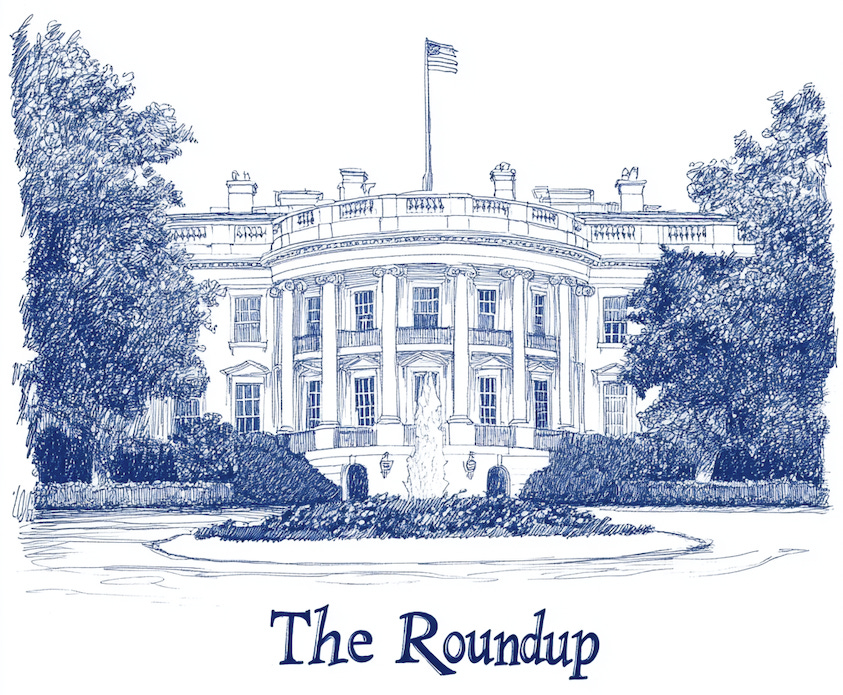Please click here to opt in to receive the Executive Functions Roundup via email and to subscribe to Executive Functions.
Judge Trevor McFadden (D.D.C.) on Tuesday enjoined the White House chief of staff, her communications deputy, and the press secretary from limiting the access of the Associated Press to events otherwise open to White House journalists. Judge McFadden stayed his order until April 13 to allow the government to seek an emergency stay and to “prepare to implement the Court’s injunction.” (Order.) (Stay order.)
Two Venezuelan men filed a lawsuit in federal district court in New York on Tuesday seeking an order preventing their transfer from the Southern District of New York and their removal from the United States under the Alien Enemies Act. The plaintiffs also requested class-action status for others whom the government may seek to remove under the Alien Enemies Act proclamation. Judge Alvin Hellerstein (S.D.N.Y.) ordered the government not to remove the plaintiffs from the district, and he scheduled a hearing on the plaintiffs’ motion for 10:00 am today. (Memorandum in Support of TRO.) (Order.) (Politico.)
Director of National Intelligence Tulsi Gabbard has established a new group to investigate “weaponization” and “politicization” within the Intelligence Community. (Memo.)
The New York Times described how the deal came into effect between Willkie Farr & Gallagher and the Trump administration. (NYT.)
Jason Willick wrote that if Trump administration lawyers misinterpret the Supreme Court’s Alien Enemies Act ruling as permitting deportations lacking process, confrontation between the government and the Court is inevitable. (WAPO.)
Aziz Huq argued that litigants against Trump administration policies should focus on a principle, embraced by the Supreme Court, that bars “arbitrary governmental action, and in particular government actions motivated by spite or ill will.” (WAPO.)
Erwin Chemerinsky and Laurence Tribe analyzed the implications of the government’s arguments in the Alien Enemies Act and Abrego Garcia cases. They contended that according to the government’s claims, “There would be nothing to stop the government from jailing its critics in another country and then claiming, as it is now, that the courts have no jurisdiction to remedy the situation.” (NYT.)
Jeffrey Vagle argued that the conflation of the principles established in two Supreme Court cases about sensitive government information “has been a source of an expansion of the scope and application of the [state secrets] privilege, creating artificial obstacles for plaintiffs seeking relief in matters dealing with issues of foreign policy and national security.” (Lawfare.)
Josh Blackman analyzed the standing arguments in connection with the Supreme Court’s grant of the government’s application for a stay of a district court order requiring reinstatement of federal probationary workers. (The Volokh Conspiracy.) (Supreme Court’s order.)
Pending Emergency Order Applications Involving the U.S. Government in the Supreme Court
Noem v. Abrego Garcia: Government filed application on April 7 to vacate district court injunction. Garcia filed response to application on April 7. Chief Justice Roberts stayed district court order on April 7. Government filed reply on April 8.
Trump v. Washington: Government filed application on March 13 to stay district court injunction. Plaintiffs filed response to application on April 4. Government filed reply on April 7.
Trump v. New Jersey: Government filed application on March 13 to stay district court injunction. Plaintiffs filed response to application on April 4. Government filed reply on April 7.
Trump v. CASA: Government filed application on March 13 to stay district court injunction. Plaintiffs filed response to application on April 4. Government filed reply on April 7.





